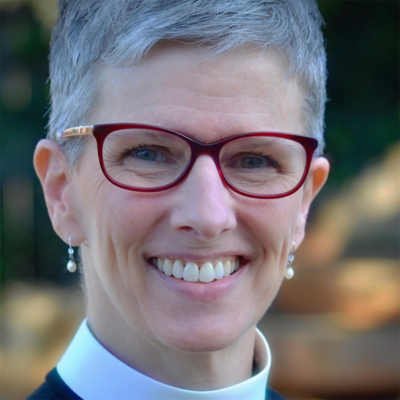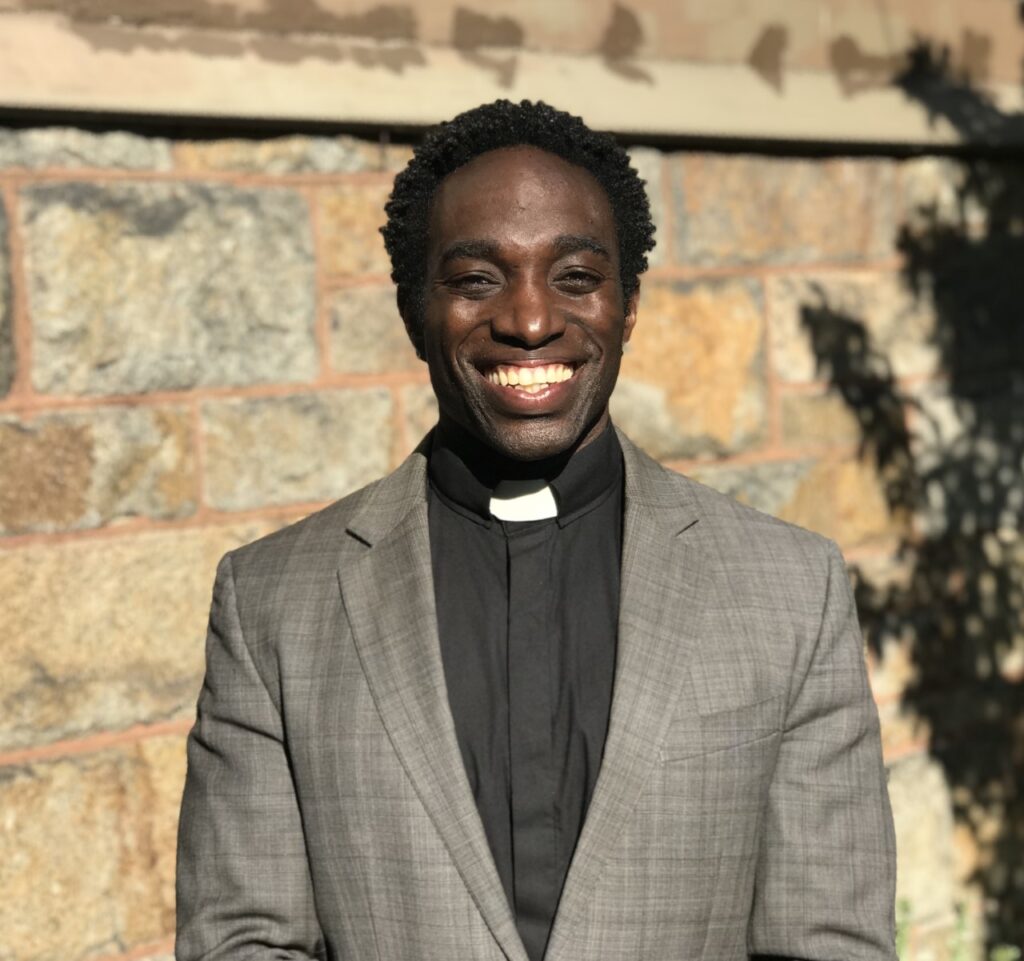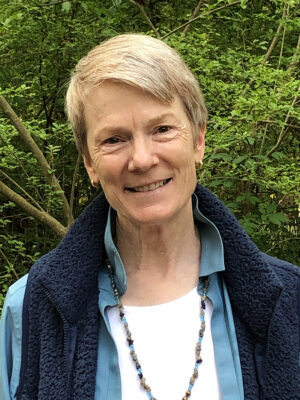On the Pulse: Alums Share Perspectives from Leading New Initiatives
CDSP graduates are leading innovative, life-giving ministries around the Episcopal Church and around the world. In this occasional interview series, we’ll ask a few of them to tell us more about their work.
The Rev. Dr. Lisa Cressman ’92: Backstory Preaching

Kyle Oliver: Tell us about your ministry at Backstory Preaching.
Lisa Cressman: I started Backstory Preaching in 2016, and it is now my privilege to work with ecumenical preachers around the world. We run a year-long intensive mentorship. We are as invested in the preacher as we are their preaching. It is at least as much spiritual direction as it is developing skills. We help preachers learn how to craft their sermons and get them done on their own schedules, so it’s not spilling over into personal lives all the time.
We ran three classes of clergy only in the diocese of Texas in our first three years, but we have since expanded and we have preachers from all different denominations. We have crossed the borders to Canada.
KO: You mentioned that part of what you do is spiritual direction. Can you say a little more about that?
LC: Back in the day, we were to present the text in its purest form. But if the text is incarnated into the particularity of the human person, then we are going to be getting in the way of the text. Our whole being goes with us into the pulpit.
Our life is preaching because it’s our experience, education, formation, and understanding of the text. The spirituality of who we are and our relationship with God is absolutely central. We try to help preachers honor that unique voice.
KO: If I, Kyle, know that I’m preaching on Sunday and I’d like to be done by Friday, where do I start and how is that connected to my incarnate spiritual life?
LC: We apply Lectio Divina to sermon prep, which has four stages to it: lectio, meditatio, oratio, and contemplatio. There is, first of all, an attitude that sermon prep is actually a prayerful event.
We start with lectio which means to read. At Backstory Preaching, we pray the coming Sunday’s gospel together.
Then we advocate the second stage of meditatio, and that’s most closely akin to exegesis. But rather than being only informed by our study, we talk about it as formative exegesis, so that it is forming the preacher as a child of God. So, we allow a vulnerability in ourselves to become more like Christ by what we are studying.
Then oratio is the application. I help preachers do their own discernment of one clear message of Good News. Just one. By Thursday or Friday, depending on your schedule, you’ve got the sermon done. You can let it rest.
Contemplatio was happening throughout the week, when you give it rest breaks in between, which is when the spirit and creativity have the greatest opportunity to work.
I literally hear from clergy spouses because they’re having date nights on Friday night because the sermons are done. The entire stress level of the household has dropped, and the preachers are really excited about what they’re preaching because they’ve been transformed themselves by the Good News. Now, they’re really jazzed: “I get to preach. Let me share with you this cool thing that just happened. This Good News I know, because I just experienced it.”
Rather than it being a box on the checklist, it’s a sense of, “I get to be sent to scripture on behalf of my congregation.”Who’s got a better job than that?
KO: How did your experience at CDSP prepare you for this kind of leadership?
LC: The faculty I got to work with was amazing, being able to be a part of the GTU, being around ecumenical peers. The formation of education, the spirituality of the daily services, and witnessing to a world that was broken in all kinds of ways–it couldn’t have set me up better. If I could design a seminary curriculum and experience, I would have designed the one I got. It was extraordinary and I’ve always been so grateful.
KO: How can all seminaries and dioceses better prepare students for work like this in the future?
LC: When we graduate from seminary, we are expected and we expect our- selves to be extraordinary preachers. But the equivalent of what we have done is we have brought somebody into a preaching course, we stuck a violin under their chin, and said, “I want you to learn to be a premiere jazz fiddler who can compose your own stuff on the spot, play beautifully and in tune, and never again have another lesson.”
Preaching is an extraordinarily complex art form, and there has never been a mechanism, before Backstory Preaching, to have a place to do that continual development. Anybody can learn to preach well, but it requires intentional practice and feedback and resources and time.
Preaching is not our volunteer job. It is a primary and central focus, more so now than ever because we’re online. Preaching is the public face of what people learn about the gospel.
KO: Based on your experience with Backstory Preaching, what would you like the wider Christian or Episcopal Church community to know?
LC: The world and the church are changing in ways that are deeper and faster than any of us have experienced in our lifetimes. We need to do lots of work to acknowledge and grieve what is passing, so that we can rise to an Easter Sunday. It is not a time to be afraid of these changes. Yes, it’s scary. But there’s a reason Jesus keeps saying over and over again,“Do not be afraid.” Have good courage. New life is always, always here.
Learn more at backstorypreaching.com.
The Rev. Edwin Johnson ‘10: Presiding Officers’ Advisory Group on Beloved Community Implementation

Kyle Oliver: You have been involved with the Presiding Officers’Advisory Group on Beloved Community Implementation in the Episcopal Church. I’m wondering if you can tell us a little bit about that ministry.
Edwin Johnson: It grew out of the General Convention in Austin, Texas. I was the chair of Committee Nine, which is on racial justice and reconciliation. Over these past two years, the committee has put forth four rounds of grants. All of these grants have been really targeted to support the building of movements around racial justice. We had a virtual summit that was also very successful.
We had the chance to really focus on helping people use different media. There’s a group in Connecticut that is predominantly Haitian. We funded a film project in Haitian-Creole. We’ve funded and empowered groups of young people to similarly capture the stories of others, to share their own stories, to use different media.
One question that we ask ourselves is, “How are these grants saving lives?” One of the programs that we funded was a group that was collaborating with a conglomeration of Black nurses.
We also do a lot of work around helping privileged folks figure out how to best organize. If you have white people and privileged communities really committing to doing their own work, then there becomes space not just to celebrate the joy and the resilience but also to multiply it.
KO: How did your experience at CDSP prepare you for this kind of leadership?
EJ: For me, CDSP felt like a cultural immersion. I remember showing up to the retreat and I was one of just a handful of Students of Color, and everything about the worship felt so foreign to me. I remember thinking to myself, “Dang, I’m going to have to do this for three years.” I think it showed me that for our Church to truly have a space for everyone, it was going to take a level of discomfort on the part of those who were most comfortable.
The theological preparation that I got at CDSP was wonderful. I took a constructive theology course with Dr. Marion Grau. It has allowed me to see and understand things theologically and integrate that into everything I do.
Obviously, my preaching has impacted this work of Beloved Community as well. When we use the words Beloved Community, we talk about the kingdom of God. My training at CDSP allows me to understand how these words are both fruitful and loaded in ways that allow us to use them in helpful ways, and also in ways that implore us to be careful with how we use them.
Finally, I was blessed to do field education in two really different contexts: at a predominantly Mexican and Mexican-American church in San Jose that was in Spanish and at a predominantly Afro-Caribbean church in Oakland as well. The chance helped me ask, “What does it mean to be asking these ques- tions within communities in which everybody is a Person of Color?” That’s critical work that I’m doing now.
KO: How can all seminaries and dioceses better prepare students for work like this in the future?
EJ: It starts with the most local relationship that you can possibly muster. One thing that I see in institutions, in schools, and in churches is oftentimes groups will say, “Okay, we want to think about and address racism.” Often, the first place they go is farther afield than from those who are right around them. If we’re talking about seminaries, what does it mean for the folks who are right outside of your walls?
What I’ve heard from those neighbors, those folks nearby, they often talk about having waited for this moment for a really long time. We’ve been able to walk with them as they’ve met for the first time. Every single time they say, “We’ve been waiting for this moment. We’re excited to work with you.”
Oftentimes, those close to us are those who’ve been most hurt by us. Nonetheless, I know that work has often been a long time coming. Even through the pain and difficulty and awkwardness, it ends up yielding the most fruit right away.
KO: Based on your experience with your ministry, what would you like the wider Christian or Episcopal Church community to know?
EJ: I am often put in the position of a teacher, of explainer, of somebody who gets it. One wonderful thing is, especially alongside my non-binary siblings who are part of this work, alongside my Asian and Pacific American siblings, and also the Indigenous folks, is I’ve learned a lot.
I’ve learned ways that I’m perpetuating things that are difficult for other people. I’ve learned ways that perhaps I and my communities can collaborate more effectively. I feel like I am emerging from this leadership position having just become a better human, a better Christian, a better follower of Jesus.
The last thing I’ll say is that it’s also just deeply personal for me. I’m also a father. My sons, Francisco and Santiago, are coming up in a world that isn’t always excited about their presence. For me, the work we’re doing right now makes me feel like wherever the world is, wherever this country is, that the Church is going to be more so.
Learn more at episcopalchurch.org/beloved-community/.
The Rev. Christie Fleming ‘17: Lighthouse Homeless Ministry

Kyle Oliver: Tell us about your ministry.
Christie Fleming: I opened the ministry about a year ago. When I moved to rural Northeast Louisiana a little over four years ago, I made friends with a number of homeless people. It
became clear that a shelter was needed and eventually I decided to open it. We’re open seven days a week.
We offer three meals a day. I’m working very hard right now to open the overnight ministry.
My bishop has been more than supportive. He said, “What would you like to do, Christie?” He gave me some time to think about it. I said, “How about opening a homeless shelter? ”He said, “Do it.”
My homeless friends have taught me that so many of us do not understand our own worth. I’ve had numerous conversations, filled with tears, when we talk about the fact that they are loved by God, they are loved by God even if they walk around in boxer shorts and a torn up t-shirt and flip-flops.
I’ll even say, “What do you think Jesus was wearing? I don’t think He was wearing a three-piece suit.”
KO: Help us envision the space.
CF: Bastrop is a town of about 9,000 people right now, majority African-American. It is in the middle of cornfields, cotton fields, and soybean fields.
I am so blessed by both the African- American community and the Latinx community here. In a place like this, an old white lady who dances on the patio with her Black and Latinx friends is seen as a total weirdo, but we have a good time.
We have a weekly chapel service. We have two women who, while I’m setting the table for Eucharist, sing songs, which is just so wonderful. Then during the announcement time, I literally sit down and we have about a ten-minute talk about whatever’s on their mind or whatever I happen to preach on or whatever. I did not anticipate that chapel service at the shelter would be such a blessing, but it blesses all of us. It really does.
It has deepened my relationship with my homeless friends because I’m not making it up when I’m with them. We’re having a good time together. We’re joking around. They’re asking me, “How could I help?”
For example, I thought that I was going to have to pay a cleaning company to come in. I don’t. I have friends who are scrubbing toilets and sweeping out the patio and mopping the floor, all of that stuff. They’re part of the process.
KO: How did your experience at CDSP prepare you for this kind of leadership?
CF: In many ways. The professors were wonderful and supportive. I’m not a brainiac, but that’s okay. We’re not all brainiacs. It helped me to see my own value in a way that I hadn’t before. I wasn’t judged for not quoting scripture off the top of my head. It was much more about our relationship with God, and that turned out to be okay.
I’m not somebody who has valued herself very well for a long time, but CDSP really helped me to see that I can be a priest. My call will be maybe a little different from others’, but I can be a priest.
KO: How can all seminaries and dioceses better prepare students for work like this in the future?
CF: A couple of years ago, before the COVID virus hit, I was down in Monroe with a member of our congregation who’s an OB-GYN, and a young Black woman came up as our waitress. We
hit it off, we were talking and laughing and joking, and all of a sudden, she shut down. I said to her, “What’s wrong?” She said, “Nothing.” I said, “No, no, no. Something happened.” She said, “I just learned that you think I’m going to hell.” I said, “I do?” She said,“ Yes, I just heard that you’re a pastor. And I’m Muslim, so you think I’m going to hell.” I said, “Oh, you recognize Jesus as one of your major prophets, and he helped all of us to understand that there is one God.” She burst into tears, threw her arms around me, and she said, “You know that?”
That’s the kind of thing that I learned from CDSP, and I just loved that.
KO: Based on your experience with your ministry, what would you like the wider Christian or Episcopal Church community to know?
CF: Well, that you don’t have to be a brainiac. That Jesus’s call to love God and one another is manifested in countless ways. That it’s an ongoing process. Have I learned a lot? You bet. Am I continuing to learn? You bet. I’m really not fearful anymore. I’ve learned to step out across that. I’ve developed a different understanding of carrying my cross and the blessing of that.
When I retire, the bishop has said it’s going to be very hard to find somebody to do this work in the middle of nowhere, but also because of the kind of work that it is. Fortunately, I’m building relationships with a number of different churches here. There’s only one Episcopal church in Bastrop. People are coming by, bringing food or donations, and beginning to build their own relationships with the homeless community. My prayer is that because of that, because of their willingness to step out in faith and across fear, when I retire, we’re going to keep going.
Learn more at epiwla.org/ministries-the-lighthouse/.
Watch for the full interviews in upcoming episodes of our Crossings Conversations podcast.

